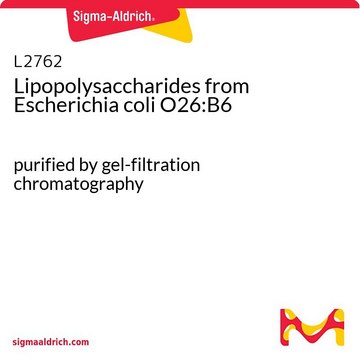L3880
Lipopolysaccharides from Escherichia coli O127:B8
purified by trichloroacetic acid extraction
Sinonimo/i:
LPS
Autenticatiper visualizzare i prezzi riservati alla tua organizzazione & contrattuali
About This Item
Prodotti consigliati
Origine biologica
Escherichia coli (O127:B8)
Livello qualitativo
Stato
lyophilized powder
Purificato mediante
trichloroacetic acid extraction
Impurezze
1-10% Protein (Lowry)
Condizioni di spedizione
ambient
Temperatura di conservazione
2-8°C
Cerchi prodotti simili? Visita Guida al confronto tra prodotti
Descrizione generale
This product is TCA extracted from E. coli serotype O127:B8. The source strain is ATCC 12740. This LPS serotype has been used in the study of septic shock and to induce NOS in murine macrophages and PAF synthesis in rat glomerular masangial cells.
Applicazioni
Lipopolysaccharides (LPSs) are characteristic components of the cell wall of Gram-negative bacteria. LPS and its lipid A moiety stimulate cells of the innate immune system by the Toll-like receptor 4 (TLR4), a member of the Toll-like receptor protein family, which recognizes common pathogen-associated molecular-patterns (PAMPs).
Azioni biochim/fisiol
Lipopolysaccharides (LPS) are localized in the outer layer of the membrane and are, in noncapsulated strains, exposed on the cell surface. They contribute to the integrity of the outer membrane, and protect the cell against the action of bile salts and lipophilic antibiotics.
Nota sulla preparazione
The product is soluble in water (5 mg/ml) or cell culture medium (1 mg/ml) yielding a hazy, faint yellow solution. A more concentrated, though still hazy, solution (20 mg/ml) has been achieved in aqueous saline after vortexing and warming to 70-80 oC. Lipopolysaccharides are molecules that form micelles in every solvent. Hazy solutions are observed in water and phosphate buffered saline. Organic solvents do not give clearer solutions. Methanol yields a turbid suspension with floaters, while water yields a homogeneously hazy solution.
Altre note
To gain a comprehensive understanding of our extensive range of Lipopolysaccharides for your research, we encourage you to visit our Carbohydrates Category page.
Prodotti correlati
N° Catalogo
Descrizione
Determinazione del prezzo
Avvertenze
Danger
Indicazioni di pericolo
Consigli di prudenza
Classi di pericolo
Acute Tox. 2 Oral
Codice della classe di stoccaggio
6.1A - Combustible acute toxic Cat. 1 and 2 / very toxic hazardous materials
Classe di pericolosità dell'acqua (WGK)
WGK 3
Punto d’infiammabilità (°F)
Not applicable
Punto d’infiammabilità (°C)
Not applicable
Scegli una delle versioni più recenti:
Possiedi già questo prodotto?
I documenti relativi ai prodotti acquistati recentemente sono disponibili nell’Archivio dei documenti.
I clienti hanno visto anche
Shiu-Ming Kuo et al.
The Journal of nutrition, 135(10), 2411-2416 (2005-09-24)
Sublethal exposure to Escherichia coli endotoxin [lipopolysaccharide (LPS)] attenuates the lethal effects of subsequent insults associated with oxidative stress, such as higher LPS dose, septic peritonitis, and ischemia. Because administration of the antioxidant ascorbate protects against these same insults and
Mandakh Bekhbat et al.
Brain, behavior, and immunity, 76, 248-257 (2018-12-15)
Adversity during development is a reliable predictor of psychiatric disorders such as depression and anxiety which are increasingly recognized to have an immune component. We have previously demonstrated that chronic adolescent stress (CAS) in rats leads to depressive-like behavior in
Claudia Patrignani et al.
Journal of inflammation (London, England), 7, 16-16 (2010-04-01)
PTPH1 is a protein tyrosine phosphatase expressed in T cells but its effect on immune response is still controversial. PTPH1 dephosphorylates TCRzeta in vitro, inhibiting the downstream inflammatory signaling pathway, however no immunological phenotype has been detected in primary T
F Dhainaut et al.
Vox sanguinis, 104(2), 115-126 (2012-09-26)
To compare in vitro and in vivo biological and biochemical properties of five liquid intravenous immunoglobulin (IVIg) preparations licensed for therapeutic use in Europe. ClairYg(®) was compared in a blinded manner to four other liquid IVIg preparations licensed in Europe
Hong Li et al.
International journal of biological sciences, 16(7), 1107-1120 (2020-03-17)
Traumatic brain injury (TBI) induces an acute inflammatory response in the central nervous system that involves both resident and peripheral immune cells. The ensuing chronic neuroinflammation causes cell death and tissue damage and may contribute to neurodegeneration. The molecular mechanisms
Il team dei nostri ricercatori vanta grande esperienza in tutte le aree della ricerca quali Life Science, scienza dei materiali, sintesi chimica, cromatografia, discipline analitiche, ecc..
Contatta l'Assistenza Tecnica.


